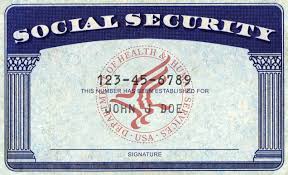 You just can’t function in today’s world without one. That social security card with a nine-digit number on a blue card gives you entrée into a job, a home, a car and a few thousand other activities essential to living.
You just can’t function in today’s world without one. That social security card with a nine-digit number on a blue card gives you entrée into a job, a home, a car and a few thousand other activities essential to living.
When President Franklin D. Roosevelt signed the Social Security Act into being on Aug. 14, 1935, it became a landmark that has left its imprint on American history since. Then, it was the middle of the Great Depression that was wreaking havoc with American lives. In its 80 years since, the program has been through world wars, boom times and bad and all the in-betweens that make a common history.
In its inception, politicians and financial experts slogged through heavy debate about how to shore up the personal finances of a struggling nation without bankrupting the taxpayers. Their solution: an insurance plan, with workers contributing through every paycheck with the promise of being able to collect a monthly stipend upon retirement.
Despite strident arguments that the program would lead to a Socialist-like control of the country’s businesses and individuals, Social Security has weathered eighty years of steady growth.
A year after the act was signed into law, Americans began to register. Self-employed professionals such as doctors, lawyers and others in high-income brackets, were excluded on the surmise they could take care of their own retirements. Also barred were field hands and domestic workers, a controversial provision based either on blatant racism, as some argued, or on their inability to make the requisite contribution to the program.
Those first enrolled in SS filled out a short form at their local post office. Some uneducated applicants filled out the form monthly and had to be asked to return the excess numbers they accumulated. Thousands of clerks had to be hired in many cities to handle the November 1935 onslaught of enrollees.
Some Americans proudly refused what they considered government largesse at the outset. When they found their paychecks were being tapped to help underwrite the program, many forgot their pride and got on board.
Critics saw elements of the “social engineering” being practiced in fascist nations, particularly in Nazi Germany. They foresaw a nation in which government intrusion would grow out of control. When the surveillance, which they assumed would inevitably lead to chains, didn’t happen, many backed off, although there have traditionally been the die-hard critics.
For the program administrators, it was simple. Each American had a number and each number had an American. First to receive his card was John D. Sweeney Jr., whose father was a wealthy New York manufacturer. However, his card wasn’t 001-01-0001. That honor went to Grace Owen of New Hampshire. The first three digits on a card identified the state or region in which the applicant lived. In the first eight days of enrollment, more than a million Americans picked up their cards. James Murray, an employee of Sobol Brothers Service Stations in New York, was heralded as the 1,000,001st recipient, with plans for a whole lot of hoopla. Sadly, he was the wrong James Murray. SS managers held off the hyped-up media while a call went to Sobol Brothers, who could not explain the situation. Then another Sobol Brothers worker recalled that a painter who worked for the company was also dubbed James Murray. The painter was rushed to the post office and became an instant celebrity, while his mistaken co-worker cooled his heels during the media frenzy. It was the most dramatic of what became a modern phenomenon: the dreaded mixup. If those who planned the media event had called for a number, instead of a name, the whole fiasco could have been avoided.
Fiascos aside, some four months after its maiden flight, SS had some 26 million enrollees. Today, the SS number is little more than a blip in the lives of Americas. A poll showed that the majority of Americans give it little thought until they reach 66 and it suddenly becomes a major factor in their lives. They have become used to the idea that a number is more germane then their names. Today, military are tracked by SS numbers rather than names. Businesses routinely look to the numbers as well. Since the 1980s, the majority of babies begin life with a number. It has been eighty years by the numbers and there’s little likelihood that anything will change.